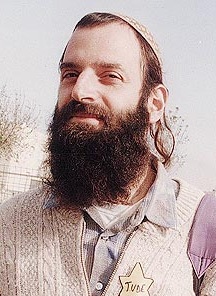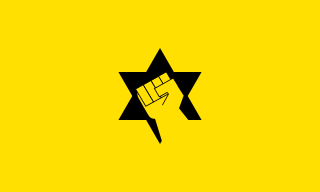Related Research Articles

The Jewish Defense League (JDL) is a far-right religious and political organization in the United States and Canada. Its stated goal is to "protect Jews from antisemitism by whatever means necessary"; it has been classified as "right-wing terrorist group" by the Federal Bureau of Investigation (FBI) since 2001, and is also designated as hate group by the Southern Poverty Law Center. According to the FBI, the JDL has been involved in plotting and executing acts of terrorism within the United States. Most terrorist watch groups classify the group as inactive as of 2015.

Meir David HaKohen Kahane was an American-born Israeli Orthodox ordained rabbi, writer, and ultra-nationalist politician who served one term in Israel's Knesset. Founder of the Israeli political party Kach—whose legacy continues to influence militant and far-right political groups active today in Israel,—he was convicted of multiple acts of terrorism in the United States and in Israel.

Baruch Kopel Goldstein was an American-Israeli mass murderer, religious extremist, and physician who perpetrated the 1994 Cave of the Patriarchs massacre in Hebron in the Israeli-occupied West Bank, an incident of Jewish terrorism. Goldstein was a supporter of Kach, a religious Zionist party that the United States, the European Union and other countries designate as a terrorist organization.
Jewish fundamentalism refers to fundamentalism in the context of Judaism. The term fundamentalism was originally used in reference to Christian fundamentalism, a Protestant movement which emphasizes a belief in biblical literalism. Today, it is commonly used in reference to movements that oppose modernist, liberal, and ecumenical tendencies within societies as well as modernist, liberal and ecumenical tendencies within specific religions and it is often coupled with extremist ideologies and/or political movements. The use of this definition is important in a Jewish context because the two movements which are most commonly associated with Jewish fundamentalism, Religious Zionism and Haredi Judaism, stray far from biblical literalism due to the importance of the Oral Law within Judaism. In fact, Karaism, the Jewish movement which is well-known due to its emphasis on biblical literalism, is rarely considered fundamentalist.
Hilltop, outpost or lot 26, was an illegal outpost, consisting of a mobile home, founded by Netanel Ozeri outside Hebron in the West Bank. It lay approximately 100 metres (330 ft) from the Kiryat Arba settlement, in the Beqa'a valley. At the time of its destruction. Despite court orders, he kept expanding his outpost, refused to bullet-proof the caravan, fence the area he claimed in, or accept protection from the IDF.

Hilltop Youth are extremist Religious Zionist settler youth operating in the Israeli-occupied West Bank. They are known for establishing outposts without an Israeli legal basis and conducting settler violence against Palestinians there.

Baruch Meir Marzel is an Israeli politician and activist. He is an Orthodox Jew originally from Boston who now lives in the Jewish community of Hebron in Tel Rumeida with his wife and nine children. He was the leader of the far-right-oriented Jewish National Front party. He is now a member of Otzma Yehudit. He was the "right-hand man" of assassinated Rabbi Meir Kahane, acting as spokesman for the American-born rabbi's Kach organization for ten years. The mainstream Israeli press has described him as an "extreme right-wing activist".

Noam Federman is a religious-Orthodox right-wing Israeli Jew in Hebron, and a former leader of the Kach Party, which he has been involved with since he was 14. He has been held in administrative detention several times. Federman hosts a weekly Internet program called "Federman Without Censor". It can be heard on the Hebrew section of the Jewish Task Force's website. JTF funds his political activities in Israel.

The Cave of the Patriarchs massacre, also known as the Ibrahimi Mosque massacre or the Hebron massacre, was a mass shooting carried out by Baruch Goldstein, an American-Israeli physician and extremist of the far-right ultra-Zionist Kach movement. On 25 February 1994, during the Jewish holiday of Purim, which had overlapped in that year with the Islamic holy month of Ramadan, Goldstein, dressed in Israeli army uniform, opened fire with an assault rifle on a large gathering of Palestinian Muslims praying in the Ibrahimi Mosque in Hebron. He killed 29 people, including children as young as 12, and wounded 125 others. Goldstein was overpowered and beaten to death by survivors.

Bat Ayin is an Israeli settlement in Gush Etzion in the West Bank, between Jerusalem and Hebron, founded in 1989 by Rabbi Yitzchak Ginsburg, in lands that Israel confiscated from the neighbouring Palestinian villages of Khirbet Beit Zakariyyah and Jab'a. It is administered by the Gush Etzion Regional Council, with a population of less than 1,000, consisting mainly of "Ba'alei T'shuva" Jews with Hasidic tendencies. The international community considers Israeli settlements in the West Bank illegal under international law, but Israel disputes this.
Jewish extremist terrorism is terrorism, including religious terrorism, committed by extremists within Judaism.
Mike Guzovsky, also known as Mike Guzofsky and Yekutiel Ben-Ya'acov, is an American-Israeli follower of the late Rabbi Meir Kahane. He lives in the settlement of Kfar Tapuach in the West Bank.

Lehava is a far-right and Jewish supremacist organization based in Israel that strictly opposes Jewish assimilation, objecting to most personal relationships between Jews and non-Jews. It is opposed to the Christian presence in Israel. It has an anti-miscegenation focus, denouncing marriages between Jews and non-Jews forbidden by Orthodox Jewish law. The group has over 10,000 members. In 2024, the United States placed Lehava and its leader, Bentzi Gopstein, on a sanctions list for their role in fomenting Israeli settler violence against Palestinians in the Israeli-occupied West Bank, labeling Lehava "the largest violent extremist organization in Israel."

Kahanism is a religious Zionist ideology based on the views of Rabbi Meir Kahane, founder of the Jewish Defense League and the Kach party in Israel.

Kach was a radical Orthodox Jewish, religious Zionist political party in Israel, existing from 1971 to 1994. Founded by Rabbi Meir Kahane in 1971 based on his Jewish-Orthodox-nationalist ideology, the party won a single seat in the Knesset in the 1984 elections, after several electoral failures. However, it was barred from participating in the next elections in 1988 under the revised Knesset Elections Law banning parties that incited racism. After Kahane's assassination in 1990 the party split, with Kahane Chai breaking away from the main Kach faction.

Ben-Zion "Bentzi" Gopstein is a political activist affiliated with the far-right in Israel, a student of Meir Kahane, and founder and director of Lehava ("Flame"), an Israeli Jewish anti-assimilation organization. He was a member of the Council of Kiryat Arba, an Israeli settlement where Otzma Yehudit leader Itamar Ben-Gvir also resides, between 2010 and 2013. In November 2019, he was indicted on charges of incitement to terrorism, violence, and racism. In April 2024, he was sanctioned by the U.S. Department of State and the European Union.

Itamar Ben-Gvir is an Israeli far-right politician and lawyer who has served as the Minister of National Security since 2022. He is the leader of Otzma Yehudit, a Kahanist and anti-Arab party that won six seats in the 2022 Israeli legislative election, and is part of what is widely regarded as the most right-wing government in Israel's history.
Meir Ettinger is an Israeli Kahanist activist, extremist and terrorist who is known for leading the Hilltop Youth, a group that pursues the expansion of Israeli settlements in the West Bank, conducts punitive price tag attacks on Palestinian villages, and targets Muslim and Christian sites. Ettinger has called for the demolition of the secular state of Israel, and its replacement by a religious society based on Biblical principles.
Sicarii (Daggermen) was a Jewish terrorist group active in Israel that took responsibility for a series of terrorist attacks between 1989 and 1990 on Palestinians and Jewish political and media figures sympathetic to the plight of Palestinians. They named themselves after the ancient Sicarii rebels, a group of Jewish zealots who opposed the Roman occupation of Judaea.
Far-right politics in Israel encompasses ideologies such as ultranationalism, Jewish supremacy, Jewish fascism, Jewish fundamentalism, Anti-Arabism, and ideological movements such as Neo-Zionism and Kahanism.
References
- 1 2 3 4 5 Frontline: Israel's Next War: An Interview with Dan Setton
- ↑ Frontline: Shattered Dreams of Peace, the Road from Oslo
- ↑ Peabody Awards Archived 2010-06-10 at the Wayback Machine .
- ↑ Time Warner. Archived 2004-10-11 at the Wayback Machine
- ↑ G.J. Church et al., "When Fury Rules", Time, March 7, 1994
- ↑ BBC On This Day.
- ↑ "Kach and Kahane Chai". Archived from the original on December 16, 2002..
- 1 2 Frontline: Israel's Next War.
- 1 2 3 4 5 Frontline: Israel's Next War: Transcript
- ↑ This is the spelling of the name as given in the transcript of the film here. Note that in the interview with Setton here, the name is given as Yitshak Pass.
- ↑ Sam Allis. "Frontline takes an unsettling look at extremist Israeli settlers', in the Jerusalem Post , April 5, 2005.
- ↑ This appears in the English-language transcript cited above, and is quoted in the aforementioned article in the Jerusalem Post, however, based on a careful audit of the original Hebrew spoken by Guzovsky, it seems that he did not actually say "kick them out, kill them", but rather תדאג שהם לא יצאו משם, i. e., "make sure that they don't leave".
- 1 2 3 4 5 Ruta Kupfer, "סרט אימה", in Haaretz 20 October 2005.